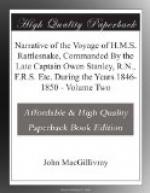On finding this out, Mr. Kennedy requested me to take charge of the stores, and issue them to the cook for the week, and from this date we all messed together. We had at this time about seven hundred pounds flour left. Everything was weighed in the presence of the whole party before I took charge, and I always weighed out every week’s ration in the presence of the cook and two other parties. At this camp it was found necessary to reduce our ration to the following scale per week; fifty pounds flour, twelve pounds sugar, two and three-quarter pounds tea, and the sheep as before—one every second day. After the ration was cooked, it was divided by the cook at every meal. We this day burned our sheepfold to lighten our loads a little.
August 15.
We were cutting through scrub nearly all day, and crossed several small creeks running westward. This day the horse carrying my specimens had become so poor and weak that he fell five different times, and we were obliged to relieve him of his load, which was now placed on one of Mr. Kennedy’s horses; but we soon found that even without a load he could not travel. We took off his saddle, bridle, and tether rope, and left him behind on a spot of good grass, where plenty of water was to be found.
The country here had a rugged and broken appearance; huge blocks of rock were lying on the open ground, sometimes one irregularly placed on the top of another, and of curious shapes. The hills as well as the valleys were generally covered with good grass, excepting in the scrub. On some of the hills the rocks were shivered into irregular pieces, and displayed crystals of quartz, small laminae of mica, and occasionally hornblende. This evening we camped by the side of a fine casuarina creek, coming from the north-east. Immediately over our camp its waters ran over a very hard trap-rock of a black colour, the soil a stiff loam.
August 16.
We travelled on for the most part of this day over irregular, barren, stony ridges, and gullies, intersected by numerous small creeks, and abounding in rocky holes, all containing plenty of water.
Two more of our horses fell several times this day; one of them being very old, and so weak that we were obliged to lift him up. We now made up our minds for the first time, to make our horses, when too weak to travel, available for food; we therefore killed him, and took meat enough from his carcass to serve our party for two days, and by this means we saved a sheep. We boiled the heart, liver, and a piece of the meat to serve us for our breakfast next day. We camped in the evening in the midst of rocky, broken hills, covered with dwarf shrubs and stunted gumtrees; the soil in which they grew appearing more sandy than what we had yet passed on this side of the range. The shrubs here were Dodonaea, Fabricia, Daviesia, Jacksonia, and two or three dwarf species of acacia, one of which was very showy, about three feet high,




